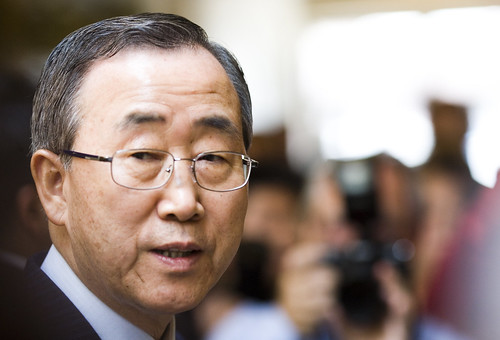On UN Secretary-General Ban Ki-moon’s Concern: Detention of Baha’is breaches Iran’s obligations under the International Covenant on Civil and Political Rights
The report of the Secretary-General of the United Nations Ban Ki-moon on the "The situation of human rights in the Islamic Republic of Iran" included the following ... -gw
G. Rights of minorities
46. The Iranian Constitution explicitly declares Islam to be the State
Religion but contains two important provisions concerning religious minorities.
Article 13 states that Zoroastrian, Jewish and Christian Iranians are the only
recognized religious minorities who are free to perform their religious rites
and ceremonies, within the limits of the law, and to act according to their own
canon in matters of personal affairs and religious education. Article 14 also
provides protection for non-Muslims, provided they refrain from conspiracy or
activity against Islam and the Islamic Republic of Iran. The Baha’i community is
not recognized as a religious minority, but the authorities assert that Baha’is
enjoy the rights accorded to all other Iranians.
47. OHCHR continues to receive reports of human rights abuses against
minorities in the Islamic Republic of Iran. While it is impossible to verify all
the information received, a pattern of concern arises with respect to the
protection of minorities, including the Baha’i community, the Arab minority in
Khuzestan, the Nematollahi Sufi Muslim community, the Kurdish community, the
Sunni community, the Baluchi community and the Azeri-Turk community.
48. Reports continued to be received about members of the Baha’i community
being subjected to arbitrary detention, confiscation of property and denial of
employment, Government benefits and access to higher education. A number of
communications have been sent by various Special Rapporteurs and the independent
expert on minority issues to the Government regarding the treatment of the
Baha’i community. The United Nations High Commissioner for Human Rights wrote on numerous occasions to express concern and seek clarification about the status of
seven members of the Baha’i faith who had been detained for more than a year. On
14 May 2008, six members of the Baha’i community — Fariba Kamalabadi,
Jamaloddin Khanjani, Afif Naeimi, Saeid Rezaie, Behrouz Tavakkoli, Vahid
Tizfahm — reportedly were arrested and have since been held in Evin prison. On 5
March 2008, a seventh member of the Baha’i community, Mahvash Sabet, was
reportedly detained by the Iranian authorities and has since been allegedly held
incommunicado in Mashhad. The Iranian authorities replied to the concerns of the
High Commissioner on 20 February 2009, noting that the arrest of the seven
Baha’is was as a result of their illegal activities. Subsequently, OHCHR
expressed concern about reports that additional charges had been laid against
the seven, including spreading corruption on earth (mofsed fil arz), which
carries the death penalty. The Iranian Government reported that the charges
included threatening and intimidating Iranian citizens to join the “sect
organization”, meddling with the private lives and beliefs of Iranian citizens
and forming a clandestine organization. The seven have yet to be produced before
a court and have been denied access to their lawyer. The High Commissioner and
the Secretary-General remain concerned that the detention of those individuals
may breach the obligations of the Islamic Republic of Iran under the
International Covenant on Civil and Political Rights, in particular freedom of
religion and belief and freedom of expression and association.
http://news.bahai.org/sites/news.bahai.org/files/documentlibrary/732_secretary_generals_report.pdf
See: http://news.bahai.org/story/732
Photo: Uploaded on September 7, 2008 by Thomas Hawk on flickr, licensed under Creative Commons Attribution-Noncommercial 2.0 Generic


No comments:
Post a Comment